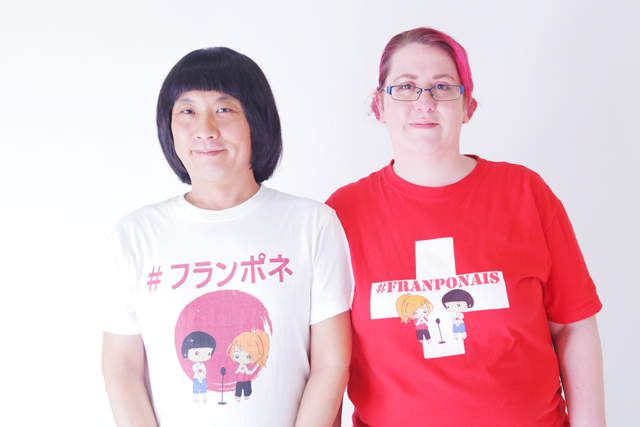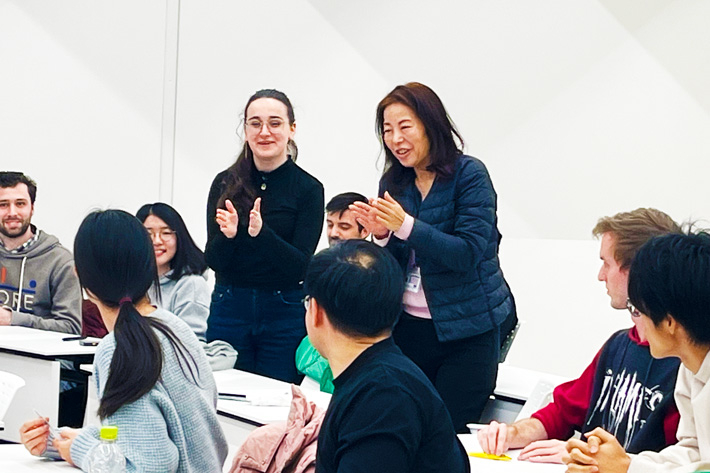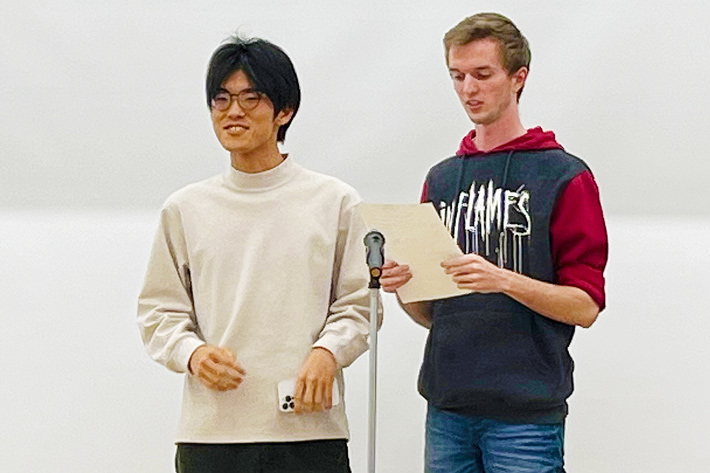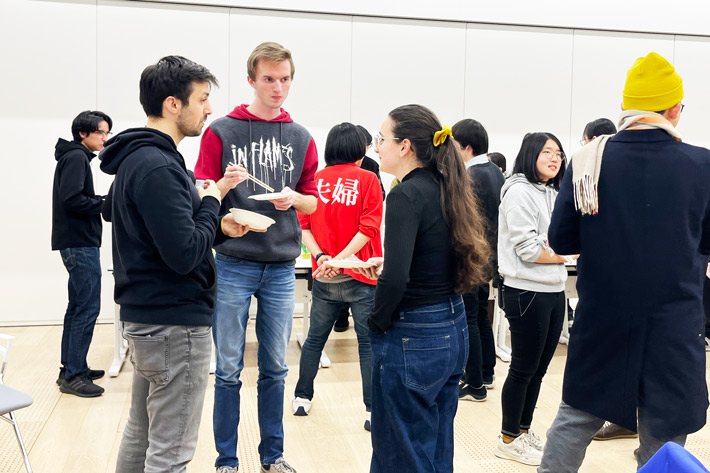Members of the Tokyo Tech community were in for a treat as international comedy duo Franponais arrived at Hisao & Hiroko Taki Plaza on Ookayama Campus to run the Japanese Comedy Workshop on January 16. The event, organized by Peer Life Coaches affiliated with the Student Success Support Section of the Student Support Center, introduced to participants manzai, a traditional style of Japanese stand-up comedy.
Joining in the fun were 27 participants ― nineteen international students, two Japanese students, and six faculty and staff members ― who represented 11 countries and regions. The aim was to create an environment of international exchange and communication using comedy as a tool, to have participants perform their own manzai at the end of the workshop, and of course, to have a good laugh together. Guiding the participants through the event, which mixed Japanese, English, and other languages, were the international couple that make up duo Franponais.
Guidance by multilingual duo Franponais
Comedy duo Franponais, associated with the entertainment agency Yoshimoto Kogyo Holdings Co., Ltd., consists of Manu and Scilla-chan. Husband Manu, originally from Japan, earned a master’s degree in maritime economics from the University of Antwerp and used to work for a major trading company. He speaks six languages. Wife Scilla-chan is originally from Switzerland, and her mother tongue is French.
Franponais, the duo’s stage name, is a portmanteau combining the French words “francais” and “japonais,” which are the native languages of Scilla-chan and Manu, respectively.

Franponais’s Manu (left) and Scilla-chan Photo courtesy of Yoshimoto Kogyo Holdings Co., Ltd.
What is manzai?
Manzai, a form of stand-up comedy, has a long history in Japan and has been loved by people of the island nation for generations. It is typically performed by two or three people, one of whom usually plays the role of the fool while the others on stage take a more solemn stance. It is this gap between the silly and the serious that often makes people laugh.
International duo Franponais has spent the last several years visiting numerous educational institutions and other venues to run manzai workshops. The workshop conducted at Tokyo Tech consisted of three parts ― introduction, manzai techniques, and final performance.
Manzai creation workshop
Introduction: Self-introductions and deciding a duo name
During this activity, pairs introduced themselves to one another using the format “My name is X and I like/hate/want/am from Y.” Based on the information shared in these initial expressions, the pairs then formed their duo names. For example, after one participant stated that they loved hot springs and their pair revealed an affinity for cute South American rodents, the duo declared themselves the Onsen Capybaras!
Already at this stage, manzai proved to be an effective international exchange communication tool. This was demonstrated particularly well by a duo that decided to introduce themselves in Chinese, despite one member not being a Chinese speaker.

Participants practicing self-introductions
Manzai techniques: Comic triple and funny-straight man act
In this part of the event, the participants learned about two techniques used in manzai, the sandan-ochi approach and the boke-tsukkomi exchange. Sandan-ochi is comparable to the comic triple, where two serious statements are followed by a comedic third utterance ― the punchline. The boke-tsukkomi exchange shares similarities with the funny-straight man act, where the boke performer makes incongruous statements while the tsukkomi speaker brings the topic back on track.
Professional manzai performers often start their show with some sandan-ochi and then move to the main part of their performance. However, as this event was for beginners, the participants simply followed their sandan-ochi with some common phrases used to end a manzai performance.
Final performance of original comedy
Throughout the event, Manu and Scilla-chan offered most of their explanations on the creation of manzai scripts in English. Now and then, they also spoke Japanese to clarify terms specific to manzai stand-up. After plenty of discussion by the participants regarding their scripts, 14 duos took to the stage to give their original performances. Everyone had a blast!

Participants on stage performing original manzai
Overall, the participants seemed to truly enjoy communicating with their pairs, and the after-party that followed the main event offered everyone more opportunities to interact. The Japanese Comedy Workshop was filled with laughter from beginning to end. The three hours reserved for the event simply flew by, and all those involved made the trip home with smiles on their faces.

Friendly discussion at post-event party
The Student Success Support Section and the Institute’s Peer Life Coaches look forward to creating more entertaining events in the future.








